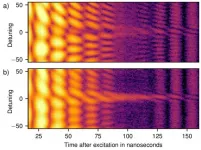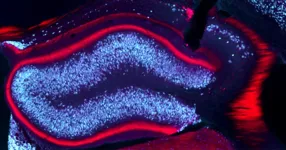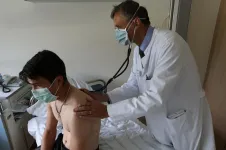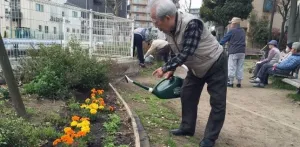(Press-News.org) Creating "super soldiers" of specific white blood cells to boost an anti-tumour response has been shown in a series of elegant experiments by Princess Margaret researchers.
Research led by Ph.D. candidate Helen Loo Yau, Post-doctoral fellow Dr. Emma Bell and Senior Scientist Dr. Daniel D. De Carvalho describes a DNA modifying epigenetic therapy that can transform immune killer T-cells into "super soldiers" by boosting their ability to kill cancer cells.
Their findings could potentially enhance immunotherapy, a new paradigm in cancer treatment currently effective for a minority of cancer patients. Some patients respond well to immunotherapy, with their tumours drastically shrinking in size, but others respond only partially or not at all. Clinicians and scientists around the world are working to understand why immunotherapy only helps some patients.
The research is published in Molecular Cell, Feb 19, 2021.
"Our goal for the future is to use this strategy combined with other immunotherapies to enhance anti-tumor immunity," says Dr. De Carvalho, Associate Professor, Department of Medical Biophysics, University of Toronto. "We imagine a future clinical trial where we collect T-cells from the patient for treatment with epigenetic therapy in the lab. This could expand the army of cancer killing cells effectively creating an 'army of super soldiers'. These cells can then be re-infused into the patient, to potentially enhance their built-in immune response to the tumour."
Dr. De Carvalho's lab first observed an increase in T-cell infiltration in mouse tumours treated with epigenetic therapy. When they removed the T-cells, the therapy stopped working, suggesting that the T-cells were contributing to the treatment success.
Intrigued by this finding, the researchers set out to apply this epigenetic DNA modifying therapy directly to T-cells in the laboratory. They isolated T-cells from healthy human donors, as well as from patients with melanoma, breast, ovarian and colorectal cancer. Their results proved that the epigenetic therapy enhanced the T-cells cancer killing ability.
Epigenetics works through addition or removal of chemical 'tags' to DNA. Much like detachable post-it notes, these tags help to specify which genes can be turned on or off. Simply, you can change the function of a cell using drugs that change these epigenetic tags.
In essence, the researchers found that an available chemotherapy drug removed specific epigenetic tags that were keeping genes off in a subset of key genes in T-cells. Removing these tags turned these genes back on, and acted to "turbocharge" the T-cells to become more effective killing machines.
The researchers discovered two specific genes that were activated by the epigenetic therapy and which were responsible for the T-cells to become better at killing the cancer cells.
High-dimensional, single-cell mass cytometry analyses - a next generation technology, which profiles single cells and drug response - revealed an increase in the numbers of granzyme and perforin proteins, which T-cells use to carry out their killing function. When unleashed, like a lethal swat team, perforins are able to punch holes in a cell's membrane to allow granzymes to enter into an infected or cancerous cell to finish the job of killing it.
"The T-cells became sort of 'super soldiers', with highly activated molecules - with bigger and better weapons - to destroy the cancer cells," explains Dr. De Carvalho, adding the paper describes in detail the molecular mechanism of how the process occurs.
A key novelty in the paper is using epigenetic therapy to influence the behaviour of genes in the T-cell. Most research on epigenetic therapies focuses on their effect on cancer cells. However, this paper looks at how our immune cells respond, giving insight into how we can boost the anti-tumour activity of our immune systems.
The emerging field of epigenetic therapy seeks to influence genetic activity without actually modifying the sequence of DNA - making this an exciting therapeutic avenue of cancer research.
"Genetic manipulation of immune cells for treatment is not trivial experimentally. It's even more complicated and expensive in clinical implementation," says Dr. De Carvalho, "Our work sets the stage for clinical investigations combining epigenetics with other immunotherapy strategies."
INFORMATION:
This research was supported by Canadian Institutes of Health Research (CIHR), Princess Margaret Cancer Foundation, Terry Fox Research Institute, Ontario Institute for Cancer Research, Canadian Cancer Society Innovation Award, and the Scotiabank Research Chair.
Competing Interests
Dr. Daniel De Carvalho received research funds from Pfizer and Nektar therapeutics. Dr. De Carvalho is co-founder and shareholder of DNAMx, Inc. Christian Klein is employed, owns stocks, patents and royalties at Roche. John Stagg is a permanent Scientific Advisory Board member and owns stocks of Surface Oncology.
About Princess Margaret Cancer Centre
Princess Margaret Cancer Centre has achieved an international reputation as a global leader in the fight against cancer and delivering personalized cancer medicine. The Princess Margaret, one of the top five international cancer research centres, is a member of the University Health Network, which also includes Toronto General Hospital, Toronto Western Hospital, Toronto Rehabilitation Institute and the Michener Institute for Education at UHN. All are research hospitals affiliated with the University of Toronto. For more information: http://www.theprincessmargaret.ca
For media inquiries, please contact:
Alexandra Radkewycz
Senior Public Affairs Advisor
Princess Margaret Cancer Centre, University Health Network
Phone: 416 946 2846
Email: Alexandra.Radkewycz@uhn.ca
At some point, microvehicles that are small enough to navigate our blood vessels will enable physicians to take biopsies, insert stents and deliver drugs with precision to sites that are difficult to reach, all from inside the body. Scientists around the world are currently researching and developing suitable microvehicles. In most cases, they are powered and controlled by acoustic and magnetic fields or using light. However, until now, propelling microvehicles against a fluid flow had proved to be a major challenge. This would be necessary for the micromachines to be able to navigate in blood vessels against the direction of blood flow. Researchers at ETH Zurich have now developed microvehicles ...
The latest observations from Insight-HXMT were published online in Nature Astronomy on Feb. 18. Insight-HXMT has discovered the very first X-ray burst associated with a fast radio burst (FRB) and has identified that it originated from soft-gamma repeater (SGR) J1935+2154, which is a magnetar in our Milky Way.
Insight-HXMT is the first to identify the double-spike structure of this X-ray burst as the high energy counterpart of FRB 200428. This discovery, together with results from other telescopes, proves that FRBs can come from magnetar bursts, thus resolving ...
From atomic clocks to secure communication to quantum computers: these developments are based on the increasingly better control of the quantum behaviour of electrons in atomic shells with the help of laser light. Now, for the first time, physicists at the Max Planck Institute for Nuclear Physics in Heidelberg have succeeded in precisely controlling quantum jumps in atomic nuclei using X-ray light. Compared with electron systems, nuclear quantum jumps are extreme - with energies up to millions of times higher and incredibly short zeptosecond processes. A zeptosecond is one trillionth of a billionth of a second. The rewards include profound insight into the quantum world, ultra-precise nuclear clocks, ...
Before life emerged on Earth, many physicochemical processes on our planet were highly chaotic. A plethora of small compounds, and polymers of varying lengths, made up of subunits (such as the bases found in DNA and RNA), were present in every conceivable combination. Before life-like chemical processes could emerge, the level of chaos in these systems had to be reduced. In a new study, LMU physicists led by Dieter Braun show that basic features of simple polymers, together with certain aspects of the prebiotic environment, can give rise to selection processes that reduce disorder.
In previous publications, Braun's research group explored how spatial order could have developed in narrow, water-filled chambers ...
Epileptic activity originating from one or more diseased brain regions in the temporal lobe is difficult to contain. Many patients with so-called temporal lobe epilepsy often do not respond to treatment with anti-epileptic drugs, and the affected brain areas must therefore be surgically removed. Unfortunately, this procedure only gives seizure freedom to about one third of patients, so the development of alternative therapeutic approaches is of great importance. Scientists led by neurobiologist Prof. Dr. Carola Haas, head of the research group at the Department of Neurosurgery at Medical Center - University of ...
The major direct and indirect effects of covid-19 have forced the authorities to implement policies that strike a balance between minimizing the immediate health impact of the pandemic and containing the long-term damage to society arising from protective policies.
One parameter that is crucial for calculating how restrictive policies might be warranted is the mortality impact of covid-19, which has led to large-scale international collaborations in order to collect data that records deaths attributable to the pandemic.
Despite the limitations, each of these research avenues and associated health measures (infection rate, deaths and excess deaths) is important in order to inform the public and policymakers about the mortality impact of covid-19.
"Our results confirm that the mortality ...
When can tuberculosis therapy be stopped without risk of relapse? Doctors are faced with this question time and again, because the lack of detection of the tuberculosis pathogen Mycobacterium tuberculosis is no guarantee for a permanent cure of the lung infection. Patients who respond to the standard therapy may be out of treatment after six months. But for resistant cases, more than 18 months of treatment duration is currently advised. "This is a very long time for those affected, who often have to take more than four antibiotics every day and suffer from side effects", explains Prof. Dr. Christoph Lange, Clinical Director at the Research Center Borstel and director of the study, conducted at the German Center for Infection Research (DZIF) in cooperation with the German Center for ...
A group of researchers has developed a new program showing participation and activity is critical for the rehabilitation of older adults in long-term care.
The results of their research were published in the journal PLOS ONE on February 12, 2021.
"Our study shows participatory programs that encourage elderly patients to be active need greater emphasis in elderly care centers," said Yoshihiko Baba, lead author of the study.
In 2015, the Ministry of Health, Labour and Welfare of Japan launched a comprehensive plan to care for the country's aging population. Crucial to this was rehabilitation centered on promoting activities that elderly patients could actively take part in.
Baba, a former ...
Although amber looks like a somewhat unusual inorganic mineral, it is actually derived from an organic source - tree resins. Millions of years ago, when this aromatic and sticky substance was slowly oozing from coniferous trees, insects and other biological material could become trapped in it. That is why some samples of amber contain fossilized specimens, preserved in a virtually pristine state, which afford fascinating snapshots of the flora and fauna of long-gone forests. Now, a research team led by LMU zoologists Viktor Baranov and Joachim Haug has made exciting ...
Semi-trucks and other heavy-duty vehicles are responsible for nearly half of road transportation carbon dioxide emissions in Europe, according to the International Council on Clean Transportation. A team of researchers in Italy has proposed a plan to reduce the emissions without compromising priorities such as delivery times. They published their approach in IEEE/CAA Journal of Automatica Sinica, a joint publication of the IEEE and the Chinese Association of Automation.
"Driving style, traffic and weather conditions have a significant impact on vehicle fuel consumption. Road freight traffic, in particular, contributes ...




